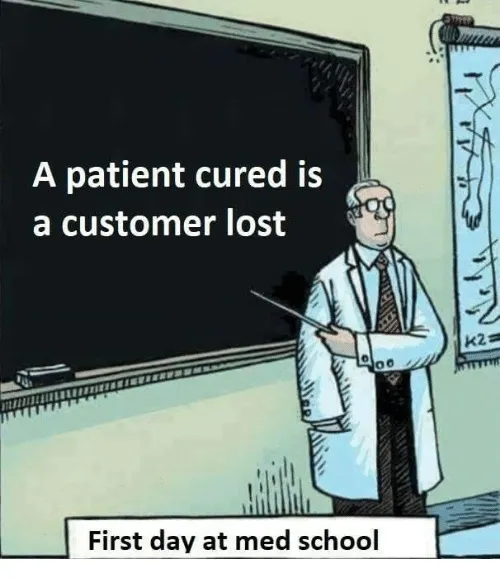Lifelong subscriptions, futures trading and deprescribing.
As a pharmacist, one of the most common questions I receive from my patients is centred around duration of therapy.
How long will I take my medicine?
Except for antibiotics, most medicines don’t really have a defined timeline. Which is insane if you think about it. You go to the doctor, complaining of stress or indigestion. You leave with a diagnosis of anxiety and a lifetime subscription to Zoloft.
In an ideal world, you would have a prolonged discussion with your physician and pharmacist about clinical options and medication therapy. We would outline the goals of therapy, and build a comprehensive care plan that includes non-pharmacological interventions, in addition to medication to help you treat the root cause of your ailment. You would have frequent follow-up and support to ensure you hit your targets. However, in reality, time and resources are scarce. Incentives are misaligned.
Prescriptions and Subscriptions
When it comes to anxiety and depression, it’s a common scenario for people to start on antidepressants with good intentions. Canadian guidelines recommend 6-9 months as an adequate duration of antidepressant therapy. However, in practice, many patients can remain on these medications indefinitely. They get caught in a therapeutic limbo, where the medicine numbs their symptoms and due to fear of relapse, they remain on the medicine with no clear end in sight. People don’t realize, but pharmacy is a subscription business. As the meme goes, a patient healed is a customer lost.

This raises a few ethical concerns. Are patients benefiting from continued medication use, or are they merely enduring side effects and incurring costs without a tangible return on their health investment? Second, we have to consider the long-term consequences of medication therapy. Antidepressants can cause a variety of long-term side effects, most notably, sexual dysfunction (even after discontinuation), weight gain, emotional blunting, and as patients age, risk of falls, stroke, and other complications.
Without clear objectives and strategies, patients fall into a cycle of long-term medication use which can then snowball into dependence and tolerance. The longer they take antidepressants, the more their brains adapt to having exogenous molecules influence their neural chemistry. This is evident if patients miss a dose or forget a refill, they can instantly feel a wave of withdrawal and negative feelings, highlighting their dependence on these agents. To create strategies to prevent patients from reaching these points, I think it’s helpful to use an analogy from investing.
Futures Trading: A Lesson in Clear Objectives
In futures trading, investors enter into contracts that obligate them to buy or sell a specific asset at a predetermined future date. This obligation, in essence, provides a well-defined plan, a roadmap if you will, of when and how they will secure that asset. It’s a strategy rooted in purpose and commitment.
Contrast this with medication therapy, where patients are often left in therapeutic limbo about the duration of their treatment. The absence of clear goals of therapy and timelines can leave patients unsure of when they can expect relief from their conditions. To address this, we must establish tangible objectives and clear therapy durations. Setting these milestones acts as an incentive and a tangible goal for patients to actively work towards improving their health by a specific timeframe.
Empowering patients to make informed decisions about their healthcare mirrors the approach of informed investors in futures trading. Just as investors carefully consider market conditions and investment strategies, patients should be well-informed about the risks and benefits of medication therapy, actively participate in shared decision-making with healthcare providers, and explore non-pharmacological alternatives.
In a world where healthcare costs continue to surge and the burden of preventable chronic diseases like hypertension, type 2 diabetes, anxiety and depression weighs heavily on society, it’s time to revisit our approach to standard medication therapy. The key is to reduce the duration of therapy while focusing on clear goals of therapy, patient empowerment, and a future that champions preventive care.
Thanks for reading.
P.S. If you or anyone you know is interested in coming off their meds or learning more about deprescribing, click on “Work with Shawn” at the top of the site, or you can fill out the form below to contact me directly.
May you be happy and healthy.
SG

